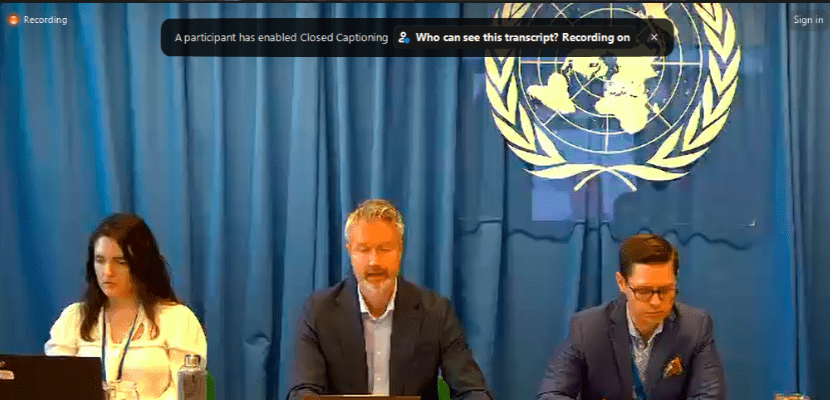
Pan-Regional Cybercrime Consultation on Combating Transnational Cybercrime
June 21, 2024
DotConnectAfrica (DCA) Group is delighted to announce our participation in the Pan-Regional Cybercrime Consultation organized by The United Nations Office on Drugs and Crime (UNODC). This significant virtual event brought together representatives from both the public and private sectors to address the escalating challenges of transnational cybercrime. Caleb, representing DCA Group, highlighted several critical issues that sparked extensive discussion among the attendees, focusing on the obstacles posed by social media companies, the need for improved collaboration between state authorities and private organizations, and the unique challenges faced by globally operating organizations.
Key Issues Raised by DCA Group
1. Challenges of Social Media Headquarters’ Jurisdiction:
Many leading social media platforms are based in developed countries and primarily operate under the legal frameworks of those nations. This often leads to a lack of compliance with the laws and regulations of other countries where these platforms are extensively used. This jurisdictional disconnect creates significant barriers for international law enforcement agencies, making it difficult to hold cybercriminals accountable across different legal landscapes.
2. Non-Cooperation in Obtaining Judicial Evidence:
Another critical issue raised was the struggle of the judiciary to obtain necessary evidence from social media companies. Despite the existence of mutual legal assistance treaties designed to facilitate international cooperation in criminal matters, these platforms often do not cooperate. This lack of compliance and responsiveness hinders the effective prosecution of cybercrimes, allowing perpetrators to exploit jurisdictional loopholes and evade justice. It is crucial for social media companies to align with global judicial requirements to prevent cybercriminals from exploiting these platforms for illicit activities.
3. Inclusivity in Cybercrime Enforcement:
Traditionally, the enforcement of cybercrime laws has been the sole responsibility of state authorities, tasked with protecting the interests and security of their citizens. However, given the rapid technological advancements and increasing sophistication of cybercriminals, this approach is proving inadequate. Combating the multifaceted nature of cybercrime requires a collaborative effort that includes both the public and private sectors.
4. Global Operations and Jurisdictional Challenges:
Private organizations that operate in multiple countries face significant jurisdictional challenges. Navigating the complex web of differing legal requirements and regulatory environments can be overwhelming. This complexity is further compounded when dealing with cyber incidents that cross borders, necessitating a coordinated international response. Private organizations must be equipped with the knowledge and resources to manage these challenges effectively.
The Need for Private Sector Involvement
DCA Group strongly advocates for a more inclusive approach, where private organizations are formally integrated into the framework for combating cybercrime. Private entities like DCA possess unique insights, technological capabilities, and resources that can significantly enhance the effectiveness of cybercrime prevention and response initiatives. By leveraging the expertise and innovative capacities of private organizations, governments can establish a more robust and agile framework to address the complexities of transnational cybercrime.
Recommendations for Enhanced Cooperation
The Pan-Regional Cybercrime Consultation emphasized the need for enhanced international cooperation, resource sharing, and the harmonization of legal frameworks. To achieve this, DCA Group recommends the following actions:
1. Formalize Partnerships: Governments should establish formal roles for private organizations in cybercrime enforcement strategies. This can include public-private partnerships, advisory roles, and collaborative task forces.
2. Enhance Cooperation with Social Media Companies: It is crucial to foster better cooperation between social media companies and judicial authorities. This can be achieved through international agreements, regulatory frameworks, and incentives for compliance with evidence-sharing protocols.
3. Legislative Harmonization: Efforts should be made to harmonize cybercrime laws across different jurisdictions. This will help eliminate legal gaps and create a unified approach to tackling cybercrime on a global scale.
4. Equip Global Organizations: Private organizations operating in multiple countries should be equipped with the necessary resources and knowledge to navigate varying legal and regulatory landscapes. This includes training, access to legal expertise, and technological tools to effectively manage jurisdictional challenges.
As we navigate the challenges of the digital age, DCA Group remains committed to contributing its expertise and resources to the global effort against cybercrime. By fostering stronger partnerships between state authorities and private organizations, we can build a safer and more secure digital environment for all. The Pan-Regional Cybercrime Consultation has laid the foundation for these collaborations, and we look forward to continuing our work in this critical area.
 Skip to content
Skip to content







Recent Comments